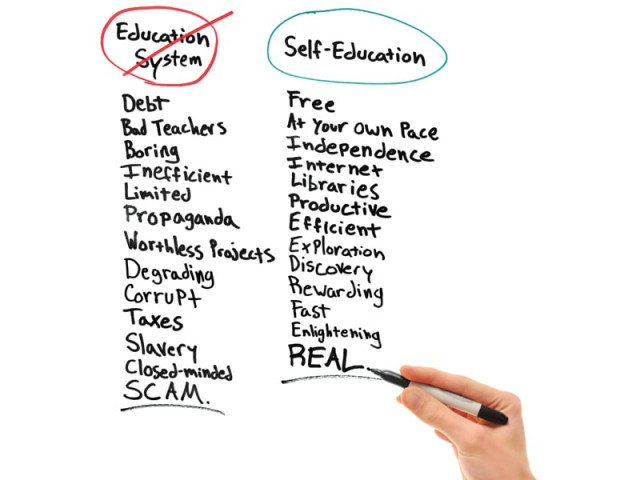My fellow Pakistanis, lend me your ears
Unending and one-sided lectures don’t do student any good.

In Pakistan, teachers use this method to complete the prescribed curriculum on time to satisfy themselves, the students and the parents. Strict adherence to this traditional style is one of the main reasons for the deterioration of our educational standards. Use of the lecture method only, is a sign that the majority of the instructors do little to prepare lesson plans, incorporate group activities or inspire students to be life-long learners.
Some teachers are working with a heavy course load, or working multiple jobs, and therefore do not have much time to put together a proper lesson before a class. Even worse, many teachers don’t make organised plans because of sheer negligence and ignorance. This is often because of the mindset of such instructors who consider the act of educating as a part of their job description and lack the passion to impart knowledge. For such instructors the textbook is the curriculum, the lesson plan and an end in itself. On the other hand, effective teachers first plan the objectives of the lesson and then develop a lesson plan incorporating these objectives. These critically thought out and planned lessons contain content and learning beyond any one textbook, and are designed to reach more than just the ears.
Individual or group activities are used in lessons to reinforce learning and provide motivation. Activities by nature are not part of the lecture method and so students have to think and act rather than passively listen and receive. It is essential for teachers to integrate individual and group activities according to the objective of their lesson and the aptitude of the students. Students who have experienced activity based learning go on in life to become better learners and adapters to different environments. Activities often require basic materials such as in the case of model building exercises i.e. tower building, bridge building, dam building or the use of teaching aids such as pictures and multimedia. The product of group activities in-class or at home may even be displayed in the classroom or hallways.
Learning takes place throughout an individual’s life and teachers provide opportunities through formal education to foster students to be self-learners. Very little outside the school is black and white, and while listening and taking notes are both important skills, life requires its own learning which the lecture cannot provide. In the lecture method, the teacher is in charge of learning, in other methods such as learning by doing, hands on learning and discovery learning, the student himself/herself takes charge. For example, a science teacher who plans an excursion where students search for insects and then continue their field research with computer resources would be encouraging her/his students to be more independent during the learning process. Students themselves begin to discover that there are insects with and without wings, some have exoskeletons, some have segmented bodies, all insects have six legs, not all bugs are insects etc.
Our education system is based on rote learning, whether it is the Matriculation or the Cambridge system. The number of tuition centres providing prepared notes is a clear-cut proof of this. This has made students lethargic and unwilling to attend regular classes. Most school teachers have little to offer beyond the textbook, and that content is already being covered in the lecture. Students now value the school less for its primary purpose i.e. the transfer of education and more for its secondary purposes i.e. socialising grounds and degree accreditation.
Sadly, when these students reach the real world, they find themselves ill-equipped to deal with its challenges. The lecture may be indispensable as a tool but its exclusive reign in the classroom has become damaging. The evolution from the lecture method towards activity-based learning is a good step in the direction of creating lifelong learners, critical thinkers and transformative leaders.
Published in The Express Tribune, July 16th, 2011.



















COMMENTS
Comments are moderated and generally will be posted if they are on-topic and not abusive.
For more information, please see our Comments FAQ